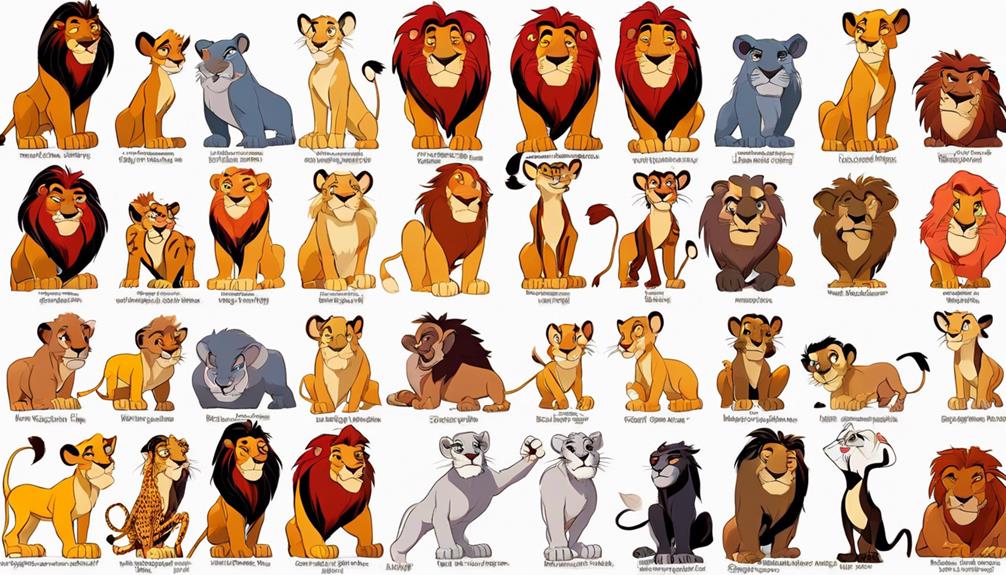The personality profiles of characters from The Lion King present an intriguing exploration into the wide range of attributes and characteristics that define these legendary figures. From the authoritative aura of Mufasa to the devious demeanor of Scar, every character provides a distinct viewpoint that is captivating to delve into.
Delving into the Myers-Briggs personality types of Simba, Nala, and other beloved characters allows us to uncover hidden depths and motivations that enrich our understanding of this timeless tale. Let's unravel the intricate web of personalities that bring the Pride Lands to life and discover the layers of complexity that lie beneath the surface.
Key Takeaways
- Leadership and empathy shine through characters like Mufasa and Nala, embodying wisdom, compassion, and inspiring guidance.
- Characters like Simba, Timon, Pumbaa, and Kiara exhibit warmth, spontaneity, creativity, and a fun-loving spirit.
- Values and traits of reliability, tradition, nurturing, and strategic planning are reflected in characters like Zazu, Sarabi, and Scar.
- Problem-solving and adaptability are showcased through characters like Rafiki, Shenzi, and their innovative, quick-thinking, and dynamic approaches.
Mufasa: ENFJ
In the Pride Lands, Mufasa reigns as a charismatic ENFJ king, guiding Simba with wisdom and compassion. As an ENFJ, Mufasa embodies the qualities of a natural leader, exuding warmth and empathy in his interactions with others in the pride. His intuitive nature allows him to seek deeper connections and understanding, making him not only a respected authority figure but also a beloved mentor. Mufasa's strong vision and sense of responsibility towards his family and kingdom are evident in his every action, reflecting the core traits of an ENFJ personality type.
Being an ENFJ, Mufasa's ability to lead with compassion and nurture relationships is crucial in shaping Simba's journey to reclaim the throne. His charismatic presence and guidance pave the way for Simba to learn valuable life lessons and grow into a wise ruler. Mufasa's ENFJ type serves as a beacon of light in the Pride Lands, symbolizing the power of empathy, leadership, and love in the circle of life.
Simba: ESFP
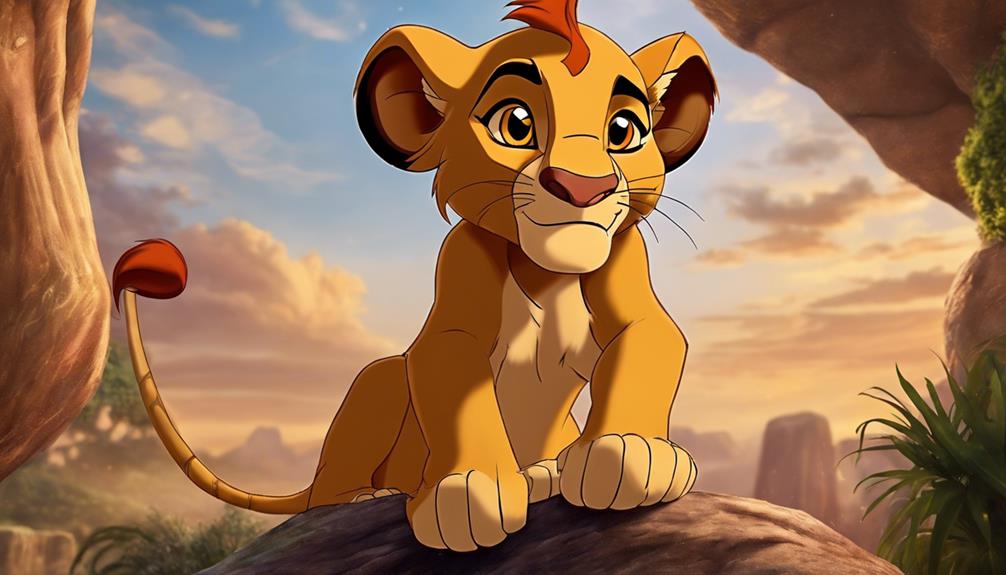
Let's talk about Simba, the ESFP of The Lion King! His leadership style, social interactions, and decision-making process are all key aspects of his vibrant personality.
Simba's Leadership Style
With his ESFP personality type shaping his leadership style, Simba from The Lion King exudes warmth, charm, and spontaneity in guiding those around him. His outgoing nature and ability to connect emotionally with others make him a natural leader.
Simba's leadership is characterized by a balance of fun-loving energy and a strong sense of responsibility, inspiring those around him to follow his lead. As an ESFP, he excels in adapting to new situations and making quick decisions, essential qualities for effective leadership.
Simba's charisma and ability to rally others stem from his genuine care for those he leads, setting him apart as a leader who leads by example and fosters a sense of unity among his pride.
Simba's Social Interactions
Simba's ESFP personality shines brightly in his social interactions, fostering genuine connections and lively exchanges within the Pride Lands.
- Spontaneous Interactions: Simba's outgoing nature leads him to engage in lively and spontaneous interactions with his friends and family, creating a vibrant social atmosphere.
- Strong Bonds: His warm-hearted and fun-loving personality allows him to form strong bonds and connections with others in the Pride Lands, making him approachable and relatable.
- Playful Banter: Thriving in social settings, Simba enjoys playful banter and meaningful conversations with loved ones, showcasing his ability to empathize and connect with others.
Simba's ability to empathize and connect with those around him not only enriches his personal relationships but also contributes to his role as a unifying and charismatic leader in the Pride Lands.
Simba's Decision-Making Process
Influenced by his ESFP personality type, Simba's decision-making process reflects a vibrant blend of spontaneity and emotional consideration. As an ESFP, Simba thrives on engaging with the world around him, using his extraverted sensing (Se) function to immerse himself in the present moment. This approach allows him to make decisions based on immediate experiences, often leading to spontaneous choices driven by his emotions.
Simba's dominant extraverted feeling (Fe) function further enhances his decision-making by prioritizing the emotional well-being of those around him. While his empathetic nature brings compassion to his choices, it can also result in impulsive decisions. Nevertheless, Simba's ESFP traits contribute to his charismatic and lively personality, making him a relatable and engaging character in The Lion King.
Nala: ESFJ
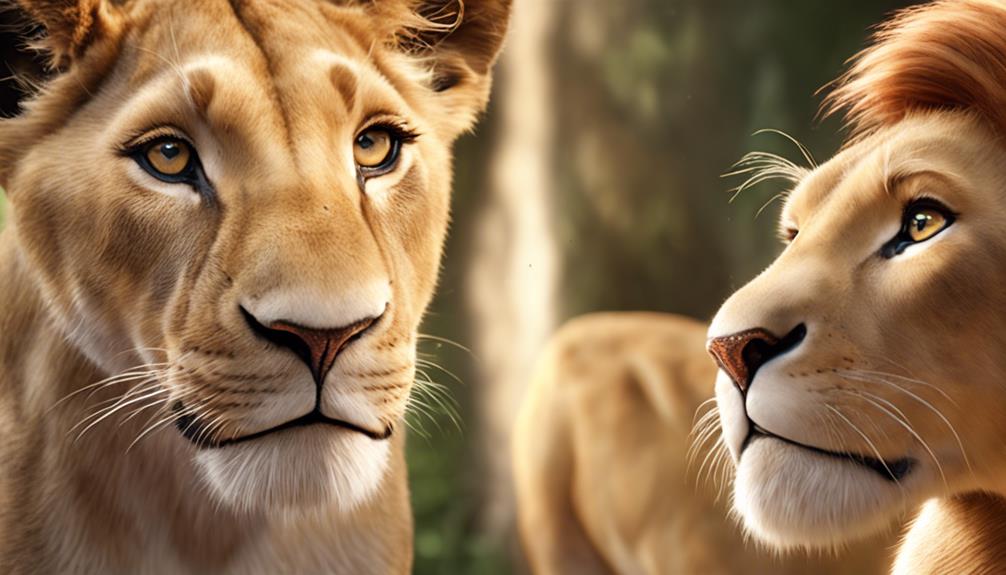
Nala's vibrant and caring demeanor as an ESFJ personality type illuminates her role as a nurturing leader in The Lion King.
- Empathetic Nature: Nala's ESFJ personality is characterized by her deep empathy towards others, especially her friends and subjects in the Pride Lands. She consistently puts the needs of others before her own, showcasing her warm-hearted and compassionate nature.
- Leadership Qualities: As an ESFJ, Nala naturally gravitates towards leadership roles due to her sense of responsibility and dedication to her community. She leads with a perfect blend of strength and compassion, making her a respected and beloved figure among the lionesses.
- Relationship-Focused: Nala's ESFJ traits shine through her strong focus on fostering and maintaining relationships. She values traditions and connections, which is evident in her interactions with Simba, her friends, and the entire pride. Nala's commitment to her relationships underscores her loyalty and reliability as a character in The Lion King.
Zazu: ISTJ
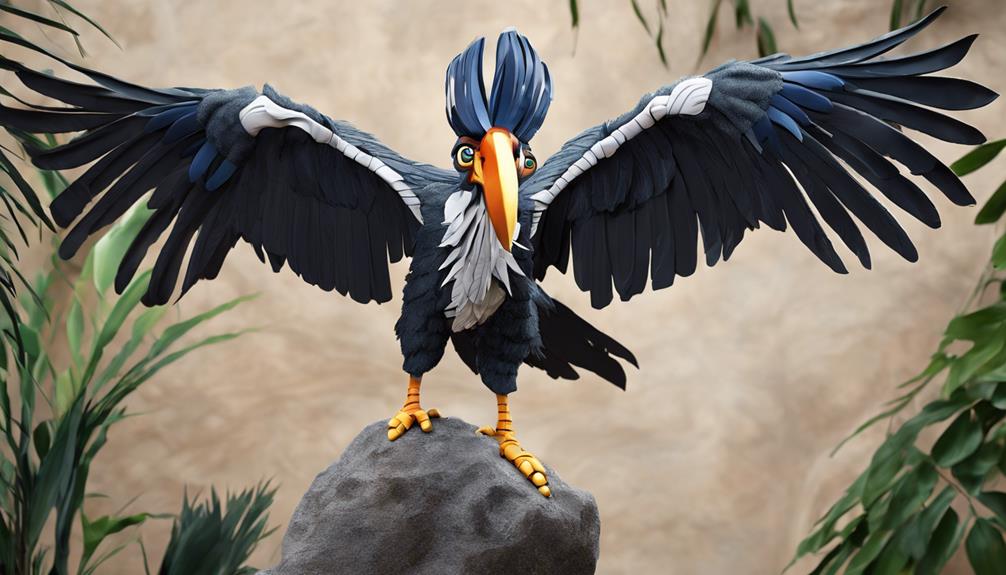
When we look at Zazu's ISTJ classification, we see a character who embodies reliability, duty, and tradition in the Pride Lands.
Zazu's role as Mufasa's advisor showcases his commitment to maintaining order and upholding the pride's values.
His practical nature and loyalty make him an essential figure in ensuring stability within the kingdom.
Zazu's Personality Traits
Zazu's steadfast dedication to duty and tradition as an ISTJ in 'The Lion King' highlights his role as a practical and observant advisor in the Pride Lands. His personality traits include:
- Loyalty: Zazu's unwavering loyalty to Mufasa and later to Simba showcases his commitment to those he serves.
- Practicality: Demonstrating a practical approach, Zazu ensures that rules and traditions are upheld for the well-being of the Pride Lands.
- Observant Nature: Zazu's keen observation skills allow him to provide valuable insights and guidance, making him an indispensable advisor.
These traits make Zazu a reliable and essential character, contributing significantly to the governance and stability of the Pride Lands.
Zazu's Role Analysis
In understanding Zazu's pivotal role as Mufasa's loyal advisor and enforcer of rules in the Pride Lands, it becomes evident that his ISTJ personality traits form the bedrock of governance and communication within the kingdom. Zazu's dedication to tradition and order, coupled with his courageous communication style and practical approach, showcases his commitment to maintaining stability. As an ISTJ, Zazu's observant nature, intelligence, and quick thinking make him an essential character in upholding the Pride Lands' hierarchy and responsibilities. Let's delve deeper into Zazu's role through the table below:
| ISTJ Characteristics | Zazu's Role in the Pride Lands |
|---|---|
| Values tradition and order | Enforces rules and governance |
| Practical and logical | Provides sound advice to Mufasa |
| Detail-oriented | Observes the Pride Lands diligently |
| Reliable and responsible | Ensures the kingdom's stability |
| Respects hierarchy | Demonstrates loyalty to Mufasa |
Scar: INTJ

Analyzing Scar as an INTJ reveals a character driven by strategic planning and a cunning nature in The Lion King.
- Scar's Architectural Thinking:
Scar embodies the Architect personality type, characterized by his preference for analytical thinking and meticulous scheming to achieve his goals. His ability to craft elaborate plans to manipulate situations reflects this trait.
- Idealism versus Cynicism:
Scar's complex personality balances idealism with cynicism, showcasing a multifaceted character influenced by his INTJ type. This interplay adds depth to his motivations and actions throughout the movie.
- Strategic Vision:
As an INTJ, Scar's dominant function of Introverted Intuition (Ni) propels his long-term vision and strategic approach to attaining power. His calculated moves and overarching plans mirror the strategic mindset typical of this personality type.
Scar's portrayal not only entertains but also serves as a stark reminder of how individuals embodying the INTJ traits can impact narratives with their strategic prowess and cunning nature.
Timon: ENTP

Embodying the ENTP personality type, Timon in The Lion King captivates audiences with his quick wit and innovative spirit. Timon's vibrant energy and sharp intellect shine through in his interactions with other characters, showcasing his love for brainstorming new ideas and exploring unconventional paths.
As an ENTP, Timon thrives in dynamic environments, constantly seeking out fresh experiences and engaging in spirited discussions. His extroverted nature allows him to connect easily with those around him, while his intuitive thinking enables him to devise creative solutions to challenges that arise.
Timon's perceptive qualities make him adept at adapting to changing circumstances, often leveraging his resourcefulness to navigate tricky situations. In The Lion King, Timon's ENTP classification illuminates his adventurous and inventive essence, adding depth and complexity to the ensemble cast.
Through his charismatic persona and penchant for thinking outside the box, Timon leaves a lasting impression on audiences, embodying the essence of the ENTP personality type in a truly memorable way.
Pumbaa: ESFP

What unique qualities make Pumbaa a standout character in The Lion King as an ESFP?
Pumbaa's warm-hearted nature and empathetic demeanor set him apart in the animal kingdom. As an ESFP, he brings a special blend of characteristics to the Pride Lands, making him a lovable and essential part of the story.
Here are three reasons why Pumbaa shines as an ESFP:
- Empathy: Pumbaa's ability to understand and share the feelings of others is one of his defining traits. He shows genuine care and concern for those around him, always ready to offer support and comfort when needed.
- Living in the Moment: Embracing life with a joyful and carefree attitude, Pumbaa lives in the present moment. His spontaneity and enthusiasm for life bring a sense of fun and light-heartedness to the group.
- Supportive Nature: Whether it's standing by Simba through thick and thin or being there for Timon, Pumbaa exemplifies loyalty and friendship. His unwavering support makes him a valuable companion and a true friend to all.
Rafiki: ENTP
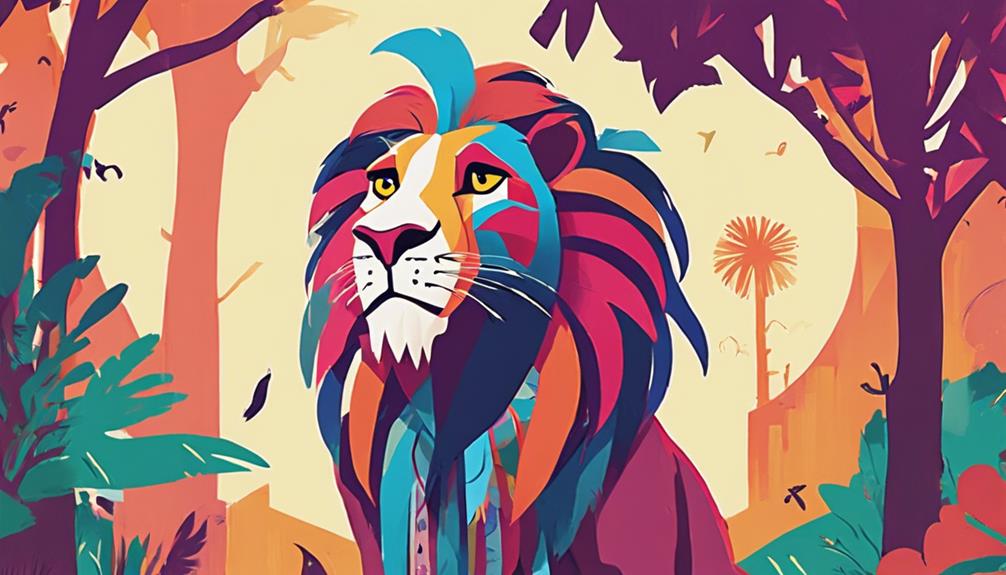
Rafiki's ENTP personality shines brightly through his innovative and unconventional approach to problem-solving in The Lion King. As an ENTP, Rafiki embodies traits such as extroverted intuition (Ne), independence, creativity, and adaptability. These characteristics allow him to offer unique perspectives and unconventional wisdom as the spiritual guide in the King's circle. Here's a table breaking down Rafiki's ENTP traits:
| Trait | Description |
|---|---|
| Extroverted | Outwardly focused, energized by interacting with others. |
| Intuitive | Sees possibilities and connections, values creativity and exploration. |
| Thinking | Makes decisions based on logic and objective analysis. |
| Perceiving | Adaptable and open to new information, spontaneous and flexible. |
| Independent | Prefers to think for oneself, values freedom and autonomy. |
Rafiki's role as a mentor figure in The Lion King is enriched by his eccentric and playful nature, drawing viewers into a world of wisdom and insight, making him one of the most intriguing characters in the movie.
Kiara: ESFP

Kiara, the spirited daughter of Simba, radiates the essence of an ESFP with her outgoing nature and emotionally intelligent demeanor, adding a vibrant energy to the Pride Lands. Her character in the Lion King franchise showcases a mix of traits that make her a truly remarkable individual:
- Curiosity: Kiara's curiosity drives her to explore beyond the Pride Lands, seeking to understand different perspectives and broaden her horizons.
- Rebellious Spirit: Despite being a future queen, Kiara's rebellious nature challenges traditional expectations, pushing boundaries to create positive change.
- Embracing Uniqueness: Kiara's journey involves embracing her uniqueness and learning to appreciate her strengths, showing others the importance of self-acceptance and authenticity.
As an ESFP, Kiara embodies the qualities of spontaneity, empathy, and adaptability, making her a beacon of optimism and growth in the Lion King universe. Her evolution from a carefree cub to a determined leader reflects the essence of the ESFP personality type.
Kovu: ISFP

With his enigmatic demeanor and inner turmoil, Kovu emerges as a compelling ISFP character in The Lion King franchise. As an ISFP, Kovu is known for his independent and introspective nature, which sets him apart from other characters in the series. His journey from being Scar's chosen heir to falling in love with Kiara and seeking redemption showcases the depth of his emotions and moral compass. Kovu's development highlights his growth from a conflicted outlander to a loyal member of Simba's pride, symbolizing the essence of an ISFP personality.
—
| Traits | Description |
|---|---|
| Independent | Prefers to make decisions based on personal values and beliefs rather than external influences |
| Introspective | Contemplates his actions and emotions deeply, often seeking meaning and understanding within himself |
| Emotional | Demonstrates a wide range of emotions, from inner turmoil to profound love and loyalty |
Shenzi: ESTP

Let's talk about Shenzi, the ESTP character from The Lion King.
Shenzi's bold leadership, resourceful nature, adaptability, and wit make her a fascinating personality to explore.
Her quick decision-making skills and ability to thrive in dynamic environments showcase the strengths of an ESTP personality.
Shenzi's Bold Leadership
In the intricate web of power dynamics within Scar's pack, Shenzi's ESTP personality type shines through her bold leadership, steering the hyenas with cunning precision. Shenzi's assertive and practical nature allows her to take charge and make quick decisions, ensuring the pack follows through on Scar's orders effectively.
Her adaptability in high-pressure situations further solidifies her role as a key leader within the group. Shenzi's focus on the present moment enables her to assess situations swiftly and act decisively, instilling a sense of confidence in her followers.
Through her bold leadership style, Shenzi plays a crucial role in maintaining the dynamic dynamics of Scar's reign over the Pride Lands.
Shenzi's Resourceful Nature
Shenzi's resourceful nature as an ESTP personality type shines through her ability to swiftly adapt to diverse situations and make decisive decisions to achieve her goals. This action-oriented approach allows her to navigate challenges effectively, utilizing her keen observational skills and quick thinking.
As part of Scar's pack, Shenzi's resourcefulness is evident in her strategic implementation of plans and her ability to lead the hyena pack with confidence. ESTPs like Shenzi thrive in dynamic environments, using their pragmatic mindset to tackle problems hands-on.
Shenzi's knack for seizing opportunities and thinking on her feet showcases her as a formidable and resourceful character within The Lion King, embodying the traits of an ESTP personality type.
Shenzi's Adaptability and Wit
Embodying the dynamic essence of the ESTP personality type, Shenzi's adaptability and wit in The Lion King captivate audiences with her quick thinking and resourceful nature.
- Living in the Moment: Shenzi excels at thriving in the present moment, reacting swiftly to changing circumstances in the Pride Lands.
- Quick Thinking: Her ability to think on her feet allows Shenzi to devise cunning schemes and outsmart her adversaries, showcasing her sharp intellect.
- Adaptability: Shenzi's knack for adjusting to new situations and environments makes her a formidable force within Scar's pack, proving her resilience and versatility in the face of challenges.
Through her adaptability, quick thinking, and ability to live in the moment, Shenzi embodies the core characteristics of an ESTP, adding depth and intrigue to her character in The Lion King.
Sarabi: ISFJ

Sarabi, the devoted queen and mother in The Lion King, showcases the personality traits of an ISFJ, embodying a nurturing and protective demeanor. As an ISFJ, Sarabi is known for her caring and selfless nature, always putting the needs of the pride above her own. Let's delve deeper into the key characteristics that define Sarabi as an ISFJ:
| ISFJ Traits | Description |
|---|---|
| Caring | Sarabi demonstrates a deep sense of care and compassion towards her family and the pride. |
| Nurturing | She shows a strong desire to nurture and protect those around her, especially her son Simba. |
| Traditional | Sarabi upholds traditional values and plays a significant role in maintaining the pride's customs. |
| Protective | A key trait of Sarabi is her protective nature, always ensuring the safety and well-being of the lionesses. |
| Harmony-focused | She strives to maintain harmony within the pride, resolving conflicts and promoting unity. |
Sarabi's character in The Lion King truly embodies the essence of an ISFJ, making her a vital and beloved member of the pride.
Shenzi: ENFP
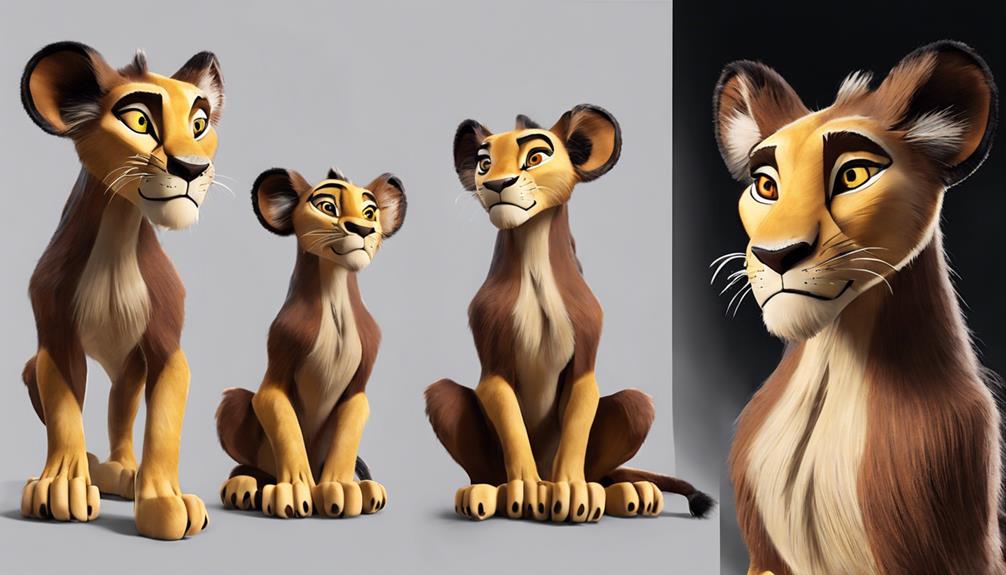
Let's talk about Shenzi and her vibrant energy that lights up the screen. Her ENFP traits shine through in her enthusiastic nature, adaptability, and imaginative spirit.
We can't help but be drawn to Shenzi's charismatic communication style and how she effortlessly connects with others in The Lion King.
Shenzi's Energetic Nature
Shenzi's vibrant energy and lively spirit as an ENFP bring a dynamic and engaging element to the group of hyenas in The Lion King.
- Shenzi's enthusiasm is contagious, often inspiring her fellow hyenas to join in on her adventures and schemes.
- Her energetic nature leads her to seek out new experiences and possibilities, pushing the boundaries of what the hyenas believe they can achieve.
- Shenzi's lively presence injects a sense of excitement and spontaneity into the group, making her a valuable asset in their interactions with other characters.
ENFP Characteristics in Shenzi
What captivating traits of the ENFP personality shine through Shenzi's dynamic character in The Lion King? Shenzi embodies the energetic, enthusiastic, and creative spirit typical of ENFPs. Her vibrant energy is evident in her interactions, decision-making, and overall approach to life. Shenzi's enthusiasm for new experiences and her creative problem-solving abilities highlight her ENFP nature. She thrives on exploring possibilities and values her freedom and independence, which are essential characteristics of this personality type. Shenzi's open-mindedness and adaptability allow her to navigate various situations with flair, reflecting classic ENFP traits. Her leadership style, rooted in inspiration and motivation, showcases how an ENFP like Shenzi can lead with passion and empathy.
| Energetic | Enthusiastic | Creative |
|---|---|---|
| High energy | Excited | Innovative |
Shenzi's Communication Style
In Shenzi's vibrant and enthusiastic communication style as an ENFP in The Lion King, creativity and spontaneity play key roles in fostering dynamic interactions. Shenzi's approach to communication is marked by her ability to emotionally connect with others and convey her ideas with passion.
Here are three aspects that highlight Shenzi's distinctive ENFP communication style:
- Creativity: Shenzi thrives on generating innovative ideas and exploring unconventional solutions in conversations.
- Spontaneity: She embraces the unexpected, adding an element of surprise and energy to her interactions.
- Focus on Possibilities: Shenzi's communication style revolves around exploring potential outcomes and encouraging others to see beyond limitations, inspiring a sense of optimism and exploration.
Mufasa: ENTJ
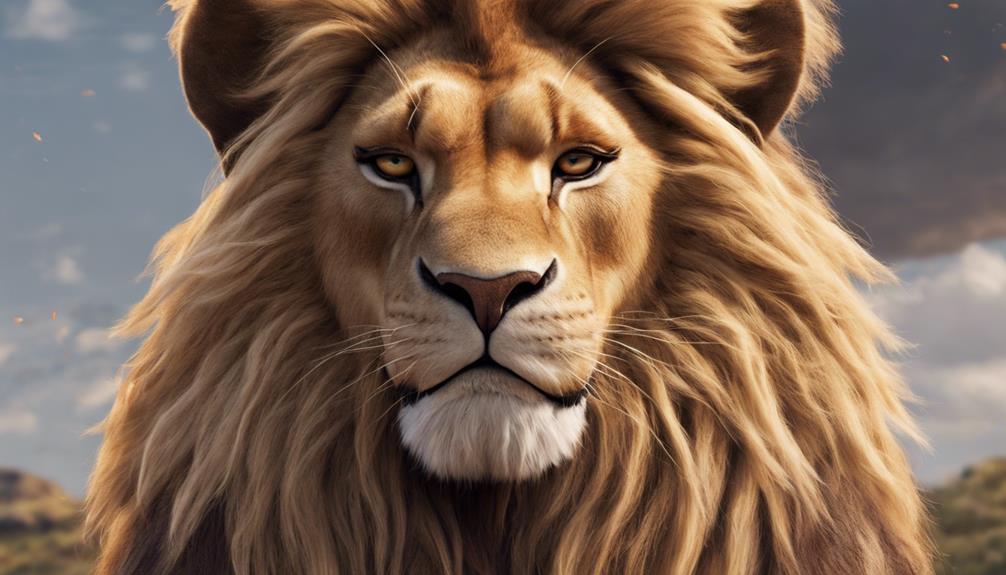
Mufasa's ENTJ personality shines through in his authoritative leadership style and strategic decision-making abilities, setting him apart as a wise and respected king in The Lion King.
As an ENTJ, Mufasa embodies good leadership qualities such as vision, charisma, and the ability to inspire others, traits that are essential for ruling over the Pride Lands. In Disney's classic movies, Mufasa's assertiveness and organizational skills reflect typical ENTJ characteristics, allowing him to lead effectively even in challenging situations.
His strong presence and influence stem from his natural inclination towards making tough decisions with confidence and foresight. Mufasa's ENTJ traits contribute significantly to his portrayal as a powerful and influential leader within the Pride Lands, earning him the admiration and respect of his subjects.
Through his strategic thinking and commanding demeanor, Mufasa exemplifies the essence of an ENTJ personality, making him a central figure in the Lion King's narrative.
Nala: ENFJ

Nala, embodying the charismatic and caring traits of an ENFJ, emerges as a beacon of compassion and leadership within the Pride Lands. Her presence exudes warmth and empathy, traits that are hallmark to ENFJs, making her a natural leader in the community. Here are three key aspects that highlight Nala's ENFJ personality:
- Empathetic Nature: Nala's ability to understand and connect with others on a deep emotional level allows her to offer unwavering support to those around her. This empathy fuels her dedication to the well-being of the Pride Lands and its inhabitants.
- Inspiring Leadership: As an ENFJ, Nala leads by example, inspiring others through her actions and words. Her courage in challenging situations, such as hunting alongside Simba or stepping up to become queen, motivates those around her to strive for greatness.
- Devotion to Others: Nala's selfless dedication to her partner, children, and community showcases her strong sense of duty and loyalty. She prioritizes the needs of others above her own, embodying the nurturing and protective qualities often associated with ENFJs.
Frequently Asked Questions
What Is the Personality of the Lion King?
When we delve into the personalities of The Lion King characters, we encounter a vibrant tapestry of traits and behaviors. From charismatic leaders to cunning villains, each character brings a unique essence to the narrative.
Whether it's Mufasa's wisdom, Scar's strategic thinking, or Timon's humor, each personality enriches the story with depth and complexity. The diverse array of traits in The Lion King showcases themes of family, unity, growth, and resilience.
What Personality Type Is Simba in the Lion King?
Simba in The Lion King embodies the ENFP personality type, known as 'The Campaigner.' This type showcases extroversion, intuition, feeling, and perceiving. Simba's curiosity, enthusiasm, and desire for growth reflect his ENFP traits.
As an ENFP, he values creativity, exploration, authenticity, and genuine connections with others. These characteristics influence his leadership, relationships, and decision-making throughout the movie, making him a dynamic and inspiring character.
What Is Mufasa's Personality in the Lion King?
Mufasa in The Lion King embodies the traits of an ENFJ, showcasing authoritative and visionary leadership qualities. He's a charismatic king who imparts essential leadership lessons to Simba.
Mufasa's warmth, wisdom, and compassion endear him to the Pride Lands, making him a revered figure. As an intuitive thinker, he seeks deeper understanding and connection with his pride.
Even beyond his tragic end, Mufasa's legacy influences Simba, leaving a profound impact on the Pride Lands.
What Is Zazu's Personality in the Lion King?
Zazu's personality in The Lion King is a unique blend of loyalty, practicality, and adherence to rules. As Mufasa's trusted advisor, Zazu plays a vital role in governance and decision-making within the Pride Lands.
His character exemplifies courage in communication and a strong respect for tradition and order. Zazu is highly observant, helpful, and dedicated to his duties, showcasing an ESTJ nature through a comedic relief role while maintaining a serious and responsible demeanor.
Conclusion
After exploring the 15 personality types of the Lion King characters, we've gained a deeper understanding of their motivations and behaviors. It's fascinating to see how each character's unique traits contribute to the overall dynamic of the story.
By delving into the Myers-Briggs personality types, we can appreciate the complexity and depth of these beloved characters even more. The theory that personalities shape our actions and relationships is truly reflected in the diverse cast of the Lion King.
